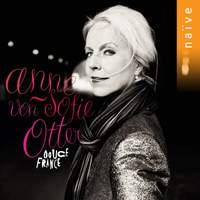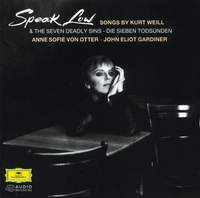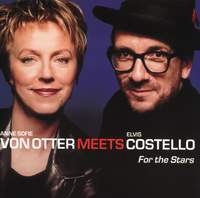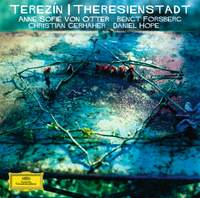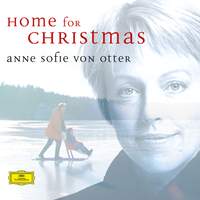Interview,
Anne Sofie von Otter on So Many Things
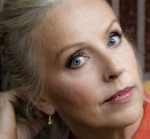 The Swedish mezzo Anne Sofie von Otter has never been shy of venturing outside the classical ‘comfort-zone’: alongside her thirty-year career as a peerless interpreter of Handel, Gluck, Mozart and Richard Strauss in particular, she’s made hugely enjoyable excursions into the world of rock, pop, cabaret and chanson (often with the pianist Bengt Forsberg by her side), and for her new album So many things, she’s teamed up with the innovative New York-based string quartet Brooklyn Rider to explore music by singer-songwriters including Kate Bush, Rufus Wainwright, Sting and Björk alongside new commissions by Nico Muhly, the Pulitzer-winning American composer Caroline Shaw, and Brooklyn Rider’s second violinist Colin Jacobsen. I caught up with her over email last week to discuss the genesis of this intriguing new collaboration, the challenges involved in ‘crossing over’ as a vocalist, and the increasing importance of new music in her operatic repertoire…
The Swedish mezzo Anne Sofie von Otter has never been shy of venturing outside the classical ‘comfort-zone’: alongside her thirty-year career as a peerless interpreter of Handel, Gluck, Mozart and Richard Strauss in particular, she’s made hugely enjoyable excursions into the world of rock, pop, cabaret and chanson (often with the pianist Bengt Forsberg by her side), and for her new album So many things, she’s teamed up with the innovative New York-based string quartet Brooklyn Rider to explore music by singer-songwriters including Kate Bush, Rufus Wainwright, Sting and Björk alongside new commissions by Nico Muhly, the Pulitzer-winning American composer Caroline Shaw, and Brooklyn Rider’s second violinist Colin Jacobsen. I caught up with her over email last week to discuss the genesis of this intriguing new collaboration, the challenges involved in ‘crossing over’ as a vocalist, and the increasing importance of new music in her operatic repertoire…
Did you have a specific theme or narrative in mind when you started working on this project, or did it grow around a particular song or songs?
The idea of this disc started with John Adams. He is a composer I truly admire, love and respect: his musicianship, his colours, rhythmic drive, always with a strong sense of today AND yesterday in terms of music. When I heard 'Am I in your light?' from Doctor Atomic I felt I really wanted to sing it , and the thought of having a new costume of string quartet quickly came to mind. Already waiting to be recorded and sung again and again was Nico Muhly´s 'So many things' which he wrote for me and Manny Ax a few years ago. Always open to suggestions, Nico was happy to re-arrange it for Brooklyn Rider. It's a great piece which feels different every time I perform it - he chose really good texts, Konstantinos Kavafis and Joyce Carol Oates. As the idea started to grow, I knew I wanted to complement the classical composers with a few of the greats from the popular music side, as I feel they have much in common. These musicians born in the twentieth century have all grown up with a mix of eg Stravinsky, JS Bach, Debussy, jazz and rock, and it shows in their music - whether they work from the classical or pop side.
There are new works by Nico Muhly, Colin Jacobsen and Caroline Shaw here – how did these commissions come about, and what was the working process like in each case?
Colin Jacobsen plays in Brooklyn Rider and has a parallel career as composer, and Caroline Shaw came highly recommended by Brooklyn Rider. With any composer who writes for me, we are likely to discuss the texts and decide together. After that, they go ahead and present it when it is finished. There is no discussion during the creation: I think a composer needs to go his or her own way during that process. Of course one can tweak the piece afterwards, but not really change a lot. In my experience this is how it works.
The disc includes songs by some very idiosyncratic singer-songwriters such as Kate Bush and Björk – how much do you think about emulating their vocal styles when performing them, or is this no more an issue than it is for classical song-repertoire that’s usually less strongly associated with a single performer?
Well I have chosen these songs by listening to specific recordings with Björk, or Sting, or Kate Bush singing themselves, with their own musical arrangement picture around the voice. Those were the versions I fell for and to which I always have listened a lot, so I am bound to imitate them in some way - that is my way of working. Listen, imitate, then create your own. I am not ashamed to say so.
You’re collaborating with the string quartet Brooklyn Rider for the first time here – how did you first meet, and what kickstarted the idea of working together?
Thanks to violinist and friend Pekka Kuusisto who knows his way around the music scene, be it world music, classical, pop or whatever. He knows what's exciting and good out there right now, and immediately suggested Brooklyn Rider when I mentioned I was looking for a string quartet with the right approach for this music. He was spot-on, I must say!
You’ve never been shy about venturing outside the ‘strictly classical’ box, especially over the past 15 years or so on disc (I think the first such recording I heard was your Weill Seven Deadly Sins) – how much do you alter your basic vocal production and sound when moving between styles like this, and how often do you find common ground between your classical and non-classical repertoire?
The Seven Deadly Sins with John Eliot Gardiner was recorded in 1993, and you are right , that was my first official project venturing into the not strictly classical on disc. Since then I have recorded Home for Christmas which has plenty of that kind of singing, and For the Stars with [Elvis] Costello etc. Singing this kind of repertoire (ie pop, cabaret, standards etc) requires you to rely on the microphone for volume and let go of the muscles and spaces in your head and body that help make a sound that carries well unamplified. You also have to find rhythmic freedom, certainly in jazz and pop. That is not easy - it requires practice and experience and a good ear, and I would say I am nowhere near a true jazz singer in that, but I try my best.
Finally, your operatic 2016/17 schedule focuses heavily on twentieth and twenty-first-century works (Berg, Eötvös, Adès etc) – are you consciously moving away from baroque and classical repertoire from here on, and can you tell us what else might be in the near future…?
At this stage of my career, I have left most of the trouser-roles and dainty young girls behind; it is a question of age. If I had a meatier, more dramatic voice, I could move into the bitches of the opera world, but I don't. So I am happy when someone like the incredibly gifted Thomas Adès writes a role for me, as he did in The Exterminating Angel. What a gift!
Anne Sofie von Otter will sing Leonora in the UK premiere of Thomas Adès's The Exterminating Angel at The Royal Opera House Covent Garden in April/May 2017.
Related recordings from Anne Sofie von Otter
Songs by Debussy, Ravel, Hahn, Legrand, Trenet and more
Available Formats: MP3, FLAC, Hi-Res FLAC
Weill: Speak Low
Anne Sofie von Otter (mezzo), Bengt Forsberg (piano), NDR-Sinfonieorchester, John Eliot Gardiner
Die Sieben Todsünden and songs from Happoy End, Lady in the Dark, One Touch Of Venus and other works
Available Formats: MP3, FLAC
Songs by Elvis Costello, Burt Bacharach, John Lennon, Benny Andersson and more
Available Formats: MP3, FLAC
Terezín/Theresienstadt
Anne Sofie von Otter (mezzo), Bengt Forsberg (piano), Christian Gerhaher (baritone), Gerold Huber (piano)
Music by Jewish composers imprisoned in the concentration camp, including Pavel Haas, Emmerich Kalman, Viktor Ullmann and Hans Krasa
Available Formats: MP3, FLAC
Seasonal classics by Irving Berlin, Mel Torme, Hugh Martin and others
Available Formats: MP3, FLAC


